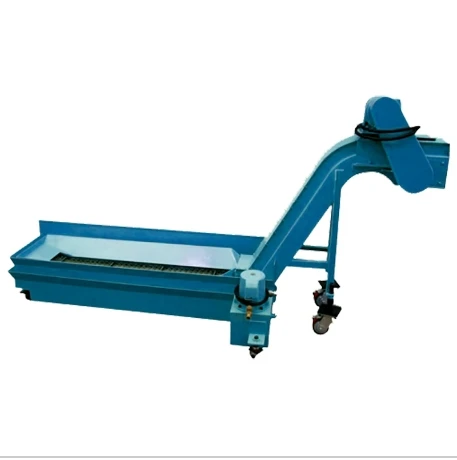For Sale High-Quality Chip Conveyors Ideal for Manufacturing Efficiency and Performance
Conveyor Systems The Key to Efficient Chip Handling in Manufacturing
In the fast-paced world of manufacturing, efficiency and reliability are paramount. One of the essential components of any successful manufacturing operation is a well-designed conveyor system. When it comes to handling chips—be it metal chips from machining processes or other types of debris—chip conveyors play an integral role in maintaining productivity and ensuring a clean working environment. This article explores the significance of chip conveyors, factors to consider when purchasing one, and a glimpse into the market, especially focusing on the availability of chip conveyors for sale.
Understanding Chip Conveyors
Chip conveyors are specialized systems designed to transport metal chips, shavings, and coolant away from machining equipment. Often used in conjunction with CNC machines, these conveyors help manage waste materials, prevent equipment clogs, and enhance the overall efficiency of the production process. Their primary function is to carry away unwanted materials while reducing the risk of workplace hazards and improving employee safety.
Types of Chip Conveyors
There are various types of chip conveyors available on the market, each suited for different manufacturing needs. Some of the most common types include
1. Metal Hinged Belt Conveyors These are robust and versatile, making them ideal for handling large volumes of metal chips. They feature a series of interlocking metal belts that efficiently transport debris to designated collection areas.
2. Apron Conveyors Best for heavy or sharp-edged chips, apron conveyors consist of heavy-duty plates that form a solid surface, allowing them to handle substantial loads without damaging the system.
3. Screw Conveyors Known for their compact design, screw conveyors are effective in transporting fine chips and shavings. They use a rotating screw mechanism to move materials along a trough.
4. Magnetic Conveyors These are specifically designed for ferrous materials and utilize magnetic forces to move chips along the conveyor path, preventing them from falling off.
Understanding the specific needs of your manufacturing process will help determine the best type of chip conveyor for your operation.
Key Factors to Consider When Purchasing a Chip Conveyor
chip conveyor for sale

When looking for a chip conveyor for sale, several factors should be taken into account
1. Material Type Identify the type of material you will be handling (metal, plastic, etc.). This will influence the choice of conveyor style, as some conveyors are more suited to specific materials.
2. Load Capacity Consider the volume and weight of the chips generated in your processes. Make sure the conveyor can handle your maximum load to prevent breakdowns.
3. Space Constraints Evaluate the available space in your facility. Some conveyors are designed to fit into tight spaces, while others may require more room for installation and operation.
4. Maintenance Needs Different conveyor types require varying levels of maintenance. A system that is easy to clean and maintain will save time and reduce costs in the long run.
5. Customization Options Some manufacturers offer customization options to tailor a conveyor system to meet your specific production needs. This can range from adding gratings to adjusting speeds and angles.
Market Overview Chip Conveyors for Sale
The market for chip conveyors is vast, with numerous manufacturers and suppliers offering a wide range of options. Online marketplaces, industrial equipment suppliers, and specialized manufacturers provide platforms for searching and purchasing chip conveyors. When considering a purchase, buyers should look for reputable suppliers known for quality products and excellent customer service.
Additionally, investing in a used chip conveyor can be a cost-effective option, as many manufacturers upgrade their systems regularly. However, it's essential to ensure that any used equipment is well-maintained and fully functional.
Conclusion
Chip conveyors are indispensable tools for modern manufacturing, enabling the efficient handling of metal chips and enhancing overall productivity. By understanding the types available and considering the critical factors during the purchase, manufacturers can invest wisely in a conveyor system that meets their specific requirements. With numerous options available for sale, finding the right chip conveyor has never been easier, paving the way for cleaner, more efficient manufacturing processes.








